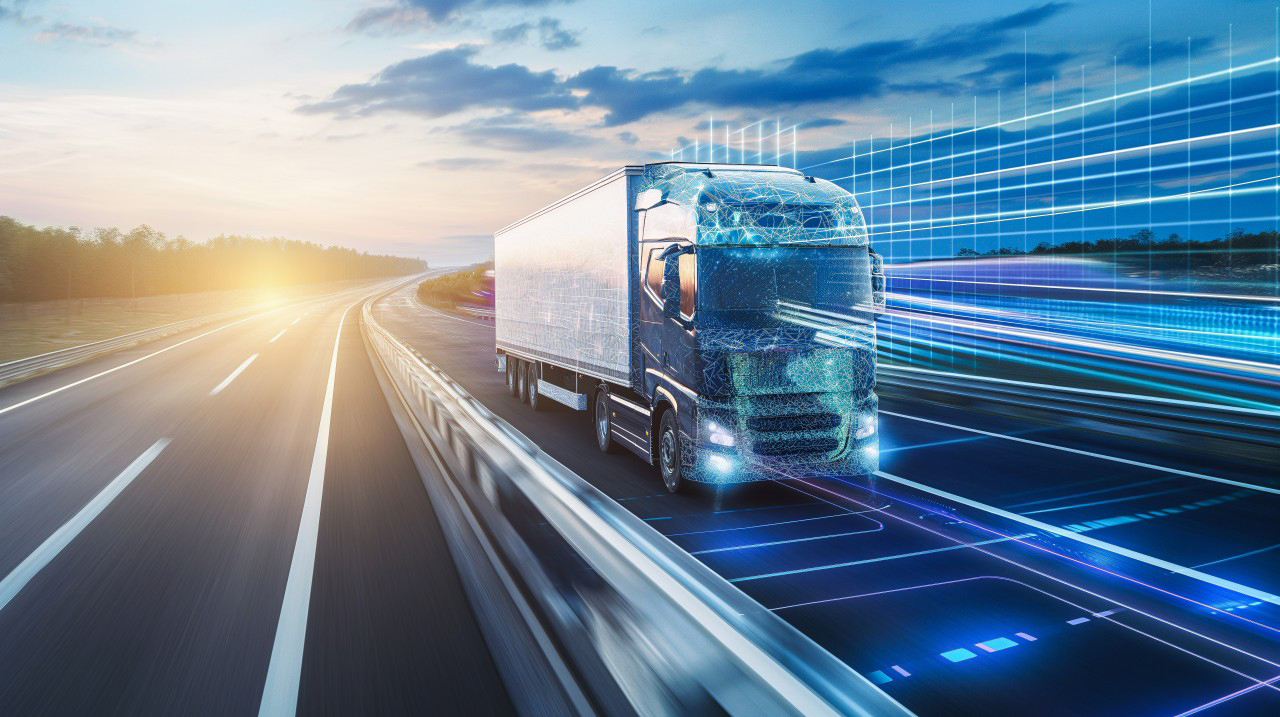
Susie Jones
Dirbtinis intelektas ir jo poveikis tvarumui krovinių vežimo pramonėje
Sukurta: 29-08-2024
•
Atnaujinta: 29-08-2024
Dirbtinis intelektas (DI) - tai terminas, kuris pastaraisiais metais tapo šiuolaikinio žodyno dalimi. Dėl nepakankamo supratimo ir klaidingų nuostatų jis dažnai vertinamas neigiamai. Nepaisant abejonių, dirbtinis intelektas gali daryti teigiamą poveikį tvarumui, darbo procesams ir ekonomikai. Ar dirbtinis intelektas gali teigiamai pakeisti tvarią ateitį, nes daugiau nei 25 % CO2 emisijų išskiria transporto pramonė?
Kas yra dirbtinis intelektas?
Pasak Oksfordo kalbų žodyno, dirbtinis intelektas yra:
"kompiuterinių sistemų, galinčių atlikti užduotis, kurioms atlikti paprastai reikia žmogaus intelekto, pavyzdžiui, vizualinio suvokimo, kalbos atpažinimo, sprendimų priėmimo ir vertimo iš vienos kalbos į kitą, teorija ir kūrimas. "
Tvarumas krovinių vežimo pramonėje
Vežimo pramonė atsidūrė kritinėje kryžkelėje, nes didėja poreikiai ir keičiasi pristatymo tipai - vienas sparčiausiai augančių poreikių yra apsipirkimas internetu. Nors išaugusi paklausa gali būti naudinga krovinių vežimo pramonei, ji susiduria su aplinkosaugine dilema, kuri daro gyvybiškai svarbų poveikį planetai.
Pramonė daro poveikį aplinkai šiais būdais:
Triukšmo tarša: Dideli sunkvežimių kiekiai gali kelti triukšmą. Triukšmo tarša trikdo miesto ir kaimo vietoves ir dažnai turi įtakos gyventojų ir laukinių gyvūnų gerovei. Didelio triukšmo poveikis gali sukelti stresą ir širdies ir kraujagyslių sistemos sutrikimus.
Išmetamo anglies dioksido kiekis: Tradiciniai sunkvežimiuose naudojami degalai į atmosferą išskiria CO2. Iš viso pasaulio transporto išmetamų teršalų 29 proc. sudaro sunkvežimių išmetami teršalai.
Oro kokybė: Sunkvežimiai išmeta azoto oksidus ir kietąsias daleles, kurios blogina oro kokybę, kenkia aplinkai ir sukelia žmonėms kvėpavimo sutrikimų.
Kaip dirbtinis intelektas gali pagerinti tvarumą
Maršrutų planavimas: Netinkamas maršruto planavimas gali kainuoti transporto parkams pinigų, laiko ir išteklių. Dirbtinis intelektas gali tiksliai numatyti poreikius ir reikalavimus - rekomenduoti tvariausią maršrutą. Jo algoritmai gali analizuoti eismo modelius, oro sąlygas ir degalų naudojimo efektyvumą, kad optimizuotų pristatymo maršrutus. Šis procesas padeda taupyti pinigus ir mažinti išmetamo anglies dioksido kiekį.
Vartotojų paklausos prognozavimas: Produktai dažnai siunčiami vartotojui, bet jų neprašoma, todėl švaistomi ištekliai ir daromas didelis poveikis aplinkai. Dirbtinio intelekto mašininis mokymasis ir prognozavimo analizė padės gamintojams numatyti paklausą, racionalizuoti tiekimą ir optimizuoti gamybos procesus. Turėdamas reikšmingų įžvalgų apie prekių pristatymą ir negavimą, AI gali informuoti logistikos įmones apie tai, kokias prekes siųsti - taip sprendžiant aplinkosaugos problemas iš pat pradžių.
Vairuotojo stebėjimas: Dirbtinio intelekto algoritmai analizuoja vairuotojo elgesį, pvz., greičio viršijimą, staigų stabdymą ir važiavimą tuščiąja eiga. Remdamasis šiais duomenimis, dirbtinis intelektas gali suteikti instruktažą ir paskatinti vairuoti taupiau.
Energijos suvartojimo mažinimas: dirbtinis intelektas gali padėti automobilių parkų bendrovėms valdyti energijos suvartojimą tiekimo grandinėse. Jis gali nustatyti neefektyvias sritis ir pateikti optimizavimo strategijas, įskaitant išmaniųjų skaitiklių, jutiklių ir kitų prietaisų duomenų analizę, siekiant nustatyti, kas naudoja per daug energijos.
Ar dirbtinis intelektas perims logistikos pramonę?
Nors dirbtinio intelekto panaudojimas bus svarbus logistikos pramonei, mažai tikėtina, kad jis visiškai ją užvaldys. Dirbtinio intelekto algoritmai negali atsižvelgti į spontaniškus įvykius ir išimtis, todėl žmogaus dalyvavimas vis dar bus labai svarbus. Karjeros galimybių krovinių vežimo pramonėje vis dar bus, tačiau jos atrodys gerokai kitaip.
Kaip dar pramonė gali sumažinti anglies dioksido išmetimą?
Pramonė gali imtis šių priemonių:
Mažai taršios transporto priemonės: Elektrinės ir hibridinės sunkiasvorės krovininės transporto priemonės gali sumažinti išmetamo anglies dioksido kiekį. Abi šios transporto priemonės tinka vežti trumpais ir ilgais atstumais.
Alternatyvūs degalai: Artėjant 2050 m., kai "Neto Zero 2050" bus pasiektas, energetikos teisės aktuose daug dėmesio skiriama švaresnėms alternatyvioms kuro rūšims. Hidriniu būdu valytas augalinis aliejus (HVO) gali iš karto ir gerokai sumažinti išmetamų teršalų kiekį. Certas Energy HVO prisideda prie perėjimo prie švaresnės alternatyvos, padėdama įmonėms siekti tvarumo tikslų ir žengti reikšmingus žingsnius link savo "grynojo nulio" ateities. HVO teikia šiuos privalumus:
Iš karto iki 90 % sumažintas šiltnamio efektą sukeliančių dujų išmetimas, palyginti su standartiniu dyzelinu, per visą gaminio gyvavimo ciklą.
Mažiau azoto oksidų nei standartiniame dyzeline
Mažiau kietųjų dalelių nei standartinis dyzelinas
Lengvai biologiškai suyra
Ilgas galiojimo laikas - iki 10 metų
Praktiškai be FAME
Alternatyvus dyzelinas - nereikia keisti variklio ar infrastruktūros.
Transporto priemonės efektyvumas: Efektyvumas gali būti padidintas naudojant taupius variklius, sumažinus tuščiąją eigą ir atlikus reguliarią techninę priežiūrą.
Išmanioji pakuotė: Gamintojai gali naudoti biologiškai skaidžias ir perdirbtas medžiagas - tai sumažina atliekų kiekį ir sąnaudas. Be to, lengvesnė pakuotė padidins efektyvumą, todėl sumažės išmetamo anglies dioksido kiekis.
Atsinaujinančioji energija: Naudojant atsinaujinančius energijos šaltinius, pvz., saulės ar vėjo energiją, galima gerokai sumažinti anglies dioksido išmetimą.
Sumažinkite apvažiavimo kilometražą: "SNAP Account" leidžia automobilių parkų valdytojams sumažinti apvažiavimo kilometražą - "SNAP Account" klientai gali naudotis daugiau kaip 600 paslaugų partnerių, todėl jūsų maršrute tikrai atsiras stotelė.


